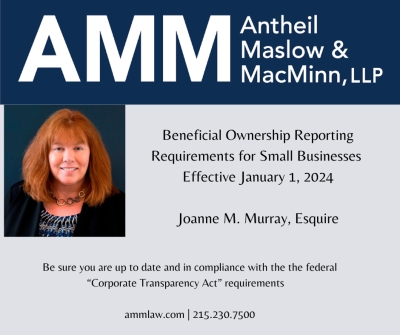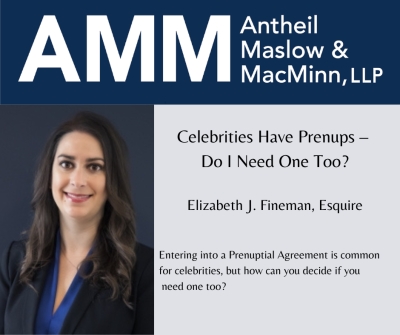AMM Blog
Welcome to the AMM Law Blog, a tool to help you keep up to date on current legal developments over the broad spectrum of our practice areas. We welcome your comments and suggestions to create a dynamic forum that will be of interest to readers and participants.
They Are Here: Beneficial Ownership Reporting Requirements for Small Businesses Go Into Effect January 1, 2024
Written by Joanne Murray Friday, October 06 2023 14:04Last year, we warned you in our business law blog that a new law, the federal Corporate Transparency Act, would be going into effect that would require many businesses to provide information about their owners and anyone who controls the company to the federal government. We now know that this law will take effect on January 1, 2024. Reporting companies in existence prior to that date have until January 1, 2025 to comply; companies formed on or after that date must comply within 30 days after formation. Once the data has been entered, companies are obligated to update any information that becomes outdated or is incorrect. The information will be included in a database that will be used to combat money laundering, financing of terrorism, and other illegal activities.
Celebrities Have Prenups – Do I Need One Too?
Written by Elizabeth J. Fineman Friday, September 15 2023 19:13
With yet another celebrity divorce making headlines, this time with Joe Jonas and Sophie Turner, there is more buzz on Prenuptial Agreements, as it has been reported that Joe and Sophie have one in effect. Entering into a Prenuptial Agreement is common for celebrities, because they often have a great deal of wealth that they want to protect. Similarly, because of their high income, many will want to limit the alimony awarded to their spouse after a divorce. Last, but not least, celebrities are highly motivated to achieve a prompt resolution in order to avoid their case playing out in the court system – with all the negative publicity that may entail.
So we know that the rich and famous are well advised to utilize Prenuptial Agreements for all of these reasons, but how can you decide if a Prenup is necessary for you?
As is many times the case in legal questions, the best answer is, “it depends”. Prenuptial Agreements are powerful instruments which can protect your assets and help avoid conflicts in the event of a divorce. If you are bringing significant assets into the marriage, or expect to inherit significant assets someday, if you have children from a previous relationship, or if, for any number of reasons, you are concerned to ensure a specific resolution in case of a breakup, a Prenuptial Agreement can provide peace of mind.
The Ninth Circuit Permits a Title VII Claim Based On Offensive Music in the Work Place
Written by Patricia Collins Tuesday, June 27 2023 19:10
Reprinted from the April 20th edition of The Legal Intelligencer. (c) 2023 ALM Media Properties. Further duplication without permission is prohibited.
In Sharp v. S&S Activewear, LLC, the United States Court of Appeals for the Ninth Circuit tackled the difficult issue of when a generally toxic workplace becomes a hostile environment under Title VII. 42 U.S.C. § 2000e-2(a)(1). The Ninth Circuit’s conclusion that employees’ allegations regarding playing offensive music in the workplace were sufficient to state a claim for a hostile work environment under Title VII relied on recent Supreme Court precedent, in Bostock v. Clayton County, 140 S. Ct. 1731 (2020); and Oncale v. Sundowner Offshore Servs, 523 U.S. 75 (1998).
The ESG Backlash: Politics and Shareholder Primacy
Written by Susan Maslow Tuesday, April 25 2023 16:47Reprinted from the April 2023 edition of Business Law Today. Further duplication without permission is prohibited.
By Susan A. Maslow
In the late 2010s and early 2020s, ESG—a wide-capturing acronym standing for “environmental, social and governance”—roared into action, emerging both domestically and abroad as one of the defining trends in investing, regulation, finance, and corporate governance.
ESG’s proponents have long sought a unified framework through which to describe interrelated standards of environmental sustainability and human rights, and bring them into greater alignment with the private sector’s traditional profit-seeking goals. This change in approach arguably gained in prominence after the Business Roundtable’s 2019 declaration on the purpose of the corporation, endorsing a vision of corporations being led for the benefit of all stakeholders, not just shareholders. Though many question the sincerity and commitment of the Roundtable, the ESG movement was super-charged, and it achieved mainstream status during the 2020 protests for racial justice, which spurred companies to integrate new goals for diversity, equity, inclusion, and racial justice into their broader ESG policies. Over the course of the last eighteen months, public company boards have been sued for breaches of fiduciary duty based on alleged failures to react to ESG factor “red flags.”
Pennsylvania Human Relations Commission Adopts Specific Definitions of Protected Classes
Written by Patricia Collins Tuesday, April 25 2023 14:17Reprinted from the April 20th edition of The Legal Intelligencer. (c) 2023 ALM Media Properties. Further duplication without permission is prohibited.
On March 23, 2022, the Pennsylvania Human Relations Commission (“PHRC”) proposed new regulations to expand the definition of certain protected classes. The Amendments will create new Pennsylvania Code Sections at 16 Pa. Code §§ 41.201 – 41.207, and would expand the terms “sex”; “religious creed” and “race” for purposes of the Pennsylvania Humans Relations Act (“PHRA”) and the Pennsylvania Fair Educational Opportunities Act (“PFEOA”). The regulations were approved on December 8, 2022. The regulations are not yet in effect, but will become effective 60 days after publication in the Pennsylvania Bulletin.
The PHRA prohibits discrimination in employment because of race, color, religious creed, ancestry, age, sex, national origin or non-job related handicap or disability. 43 Pa. Stat. § 955(a). The regulations relating to the PHRA previously provided definitions only for the terms “pregnancy” and “disability due to pregnancy or childbirth”. 16 Pa. Code 41.101. The definition of the other protected classes was left to the PHRC’s guidance and cases interpreting the statute.
The amendments to Title 16 of the Pennsylvania Code would add a new subchapter, entitled “Protected Classes”, for the purpose of ensuring that all unlawful discriminatory practices proscribed by the PHRA and PFEOA are “interpreted and applied consistently”, and that all complaints filed with the PHRC “are investigated consistent with the rules outlined herein.” The regulations calls for liberal construction to accomplish the purpose of the PHRA and PFEOA.
The Federal Trade Commission’s Proposed Ban On Non-Competes
Written by Patricia Collins Tuesday, February 21 2023 19:20Reprinted from the February 10th edition of The Legal Intelligencer. (c) 2022 ALM Media Properties. Further duplication without permission is prohibited.
On January 5, 2023, the Federal Trade Commission (“FTC”) proposed rules imposing a broad restriction on non-competition agreements (“Proposed Rule”). The Proposed Rule would require employers to rescind existing non-compete agreements, and would preempt conflicting state laws. The ban marks a dramatic change not only in the law, but in the relationship between employers and their key employees.
The Proposed Rule defines “non-compete clauses” as follows: any agreement that prevents a worker from seeking or attempting to seek employment with any employer; or, any agreement that is a de facto non-compete clause. A de facto noncompete clause has the “effect of prohibiting the worker from seeking or accepting employment.” The Proposed Rule provides examples of a de facto non-compete clause: a non-disclosure agreement drafted so broadly that it effectively precludes the employee from working in their chosen field; or a contractual term that requires the employee to pay the employer or a third party its training costs if employment terminates within a specified time period, but only where the payment is not reasonably related to the actual costs incurred by the employer.
The Proposed Rule mandates that it is a prohibited unfair method of competition to enter into or “attempt to enter into” a noncompete clause with an employee, or to maintain an existing non-compete agreement, or to represent to an employee that they are subject to a noncompete without a good faith basis to believe they are.
























